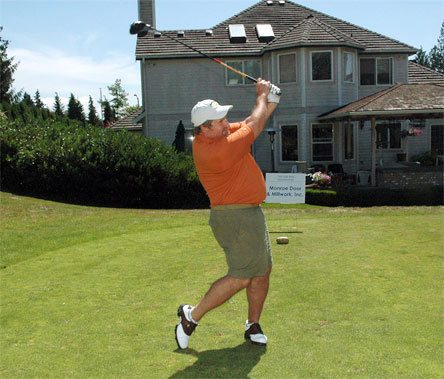ARLINGTON — The Gleneagle Golf Course hosted a July 18 fundraiser for an ailment that many people have never heard of, but whose impact hits close to home for Debbie Thomason.
Thomason, a former Marysville native who now lives in Arlington, is “Aunt Debbie” to siblings Ryan Thomason, 27, and Jodi Thomason, 30, both of whom found out that they have Usher syndrome roughly three months ago.
Usher syndrome is a relatively rare genetic disorder that causes progressive deafness and blindness in those born with it, and “Aunt Debbie” managed to raise an estimated net take of $15,000-$20,000, through a golf tournament and dinner at Gleneagle, thanks to a turnout of 144 golfers and 220 diners. These proceeds will go to Hear See Hope, a Washington state-based charity devoted to finding a cure for Usher syndrome.
Ryan and Jodi Thomason grew up in Lake Stevens, but they have relatives throughout the Marysville and Arlington area, and they expressed gratitude for the wealth of support that they’ve received, even as they noted that their condition should have been diagnosed sooner.
Both Ryan and Jodi have experienced gradual hearing loss since their childhood years, which was also when they first started wearing glasses and contact lenses. Ryan has hearing aids in both ears now, and is displeased at the doctors who “never put two and two together” until recently, especially since his and Jodi’s younger brother has such acute hearing that “he can hear the faucet dripping in the other room.”
When Ryan and Jodi were first diagnosed with Usher syndrome, they learned that “it was bigger than we thought,” in spite of its relative rarity. Statistically, it’s only likely to occur in one out of every 10,000 people, but if one person has it, their siblings have a one-in-four chance of also having Usher syndrome.
What makes it especially problematic for Ryan and Jodi is that Usher syndrome affects everyone who has it in different ways and since they weren’t diagnosed with it in childhood, it’s that much harder for doctors to track what its relative rates of progress will be for them.
“There are three different types of Usher syndrome and if you have it, what you really want is Type 2,” said Ryan, who has Type 2, along with Jodi. “With that type, you’re born with a moderate hearing loss and a slow vision loss. When I was 17, I realized I couldn’t see at night. We made jokes about me walking into a tree, but I really did. That’s why I haven’t driven at night for the past two years.”
It’s common for those diagnosed with Usher syndrome to develop tunnel-vision, and both Ryan and Jodi could be declared legally blind “by the time we’re 50, or 70, or 40. You just don’t know,” said Jodi, who suffers from what she calls “donut vision.” Her vision straight ahead and peripherally is currently 20/15, but she has a “ring” of blindness within it. Ryan likewise reported “islands” of missing vision in his own eyesight, where “I have to track all over until I can find what I’m looking for, even if it’s sitting right on my feet.”
Both Ryan and Jodi have found themselves emotionally overwhelmed by the outpouring of concern they’ve received since being diagnosed. Ryan has been contacted by acquaintances as far removed as teachers he knew from middle school, while Jodi credited the presence of family, friends and even charitable strangers with helping take her mind off what tomorrow might bring. Ryan, who has a wife and a two-year-old son, is also worried about the uncertainty of the future.
“We’d planned to retire and then travel, but this has kind of reversed that,” Ryan said. “I have to focus on living my life and being with my family in the here and now, and not take them for granted. When I play with my son, I pay attention to every detail. I feel like I have to catalog all those images, in case I can never see him or my wife again. It gets me all shaky just thinking about it.”
Both Ryan and Jodi thanked their “Aunt Debbie,” who in turn praised the local community for its generosity.
“My biggest goal with this was to show these two how much I love them,” Debbie Thomason said. “When I see how many other people are willing to support them, it makes me think that it’s a good thing that I live in a small town. It beat all my expectations.”
To learn more about Usher syndrome and Hear See Hope, you can log onto www.hearseehope.org.
Click here for more photos.



